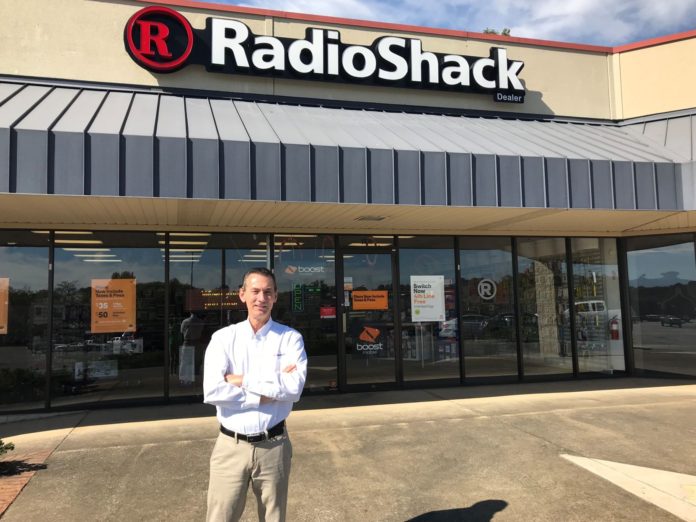With a hearing on its re-organization plan set for later this month, RadioShack looks forward to emerging from bankruptcy for the second time with a redefined vision of its future.
The Fort Worth-based electronics retailer plans to get back to basics: selling batteries, radios, HDMI cables, headphones and DIY drone kits.
But this time around, there won’t be operating corporate stores that compete with Starbucks in volume.
“We’re shifting our focus to e-commerce and dealer-owned stores,” said Steve Moroneso, RadioShack’s chief operating officer, currently the firm’s top executive, following the department of former CEO Dene Rogers in July.
“We have had lots of independent dealers approach us who want to get into the larger markets where we have operated corporate stores in the past,” Moroneso said. “There is lots of opportunity there.
“Our online sales and dealer stores [are] where our growth and future is going to be,” Moroneso said.
RadioShack’s name is now affiliated with 425 stores, including the remaining corporate stores and existing dealer locations and new dealers that are beginning to open ahead of the settlement that is expected to move the company out of bankruptcy by the end of the year, Moroneso said.
Eight dealer stores have opened within the past two months, with more on the way.
RadioShack plans to continue to operate about two-dozen corporate stores in Colorado, New York and parts of Texas, primarily in the southern regions of the state.
At its peak around the year 2000, RadioShack operated nearly 7,500 corporate stores across the United States as well as international locations such as Mexico, the United Kingdom and Australia.
But after that, the business that was founded in 1921 by two brothers in Boston as a ham radio shop with a mail-order catalogue started its downward spiral that eventually led to a Chapter 11 bankruptcy filing in February 2015 after sustaining losses for several years.
Leather goods manufacturer Charles Tandy, looking to purchase hobby-type businesses, bought the Boston firm and incorporated it into the Tandy Corporation in Fort Worth in 1962.
Focused on emerging technology, the business prospered through the 1970s and 1980s, by introducing innovations such as the TRS-80, the first fully assembled personal computer to be mass-marketed.
RadioShack became a leader in telecommunications through wireless phones and service but its electronics products eventually fell victim to competition from smartphones and retail giants like Wal-Mart and Amazon, which could undercut prices on electronic gadgets.
A joint venture between General Wireless and Sprint was intended to rescue RadioShack from bankruptcy and turnaround the company’s 1,500 remaining stores.
Two years after its first bankruptcy filing, Radio Shack’s successor, General Wireless Operators, filed for Chapter 11 bankruptcy again this past March in federal court in Delaware, placing some of the blame on its partnership with Sprint.
With most of its corporate stores closed in May, RadioShack officials have focused on building its dealer network, which has long been an integral part of the company’s business strategy.
“Our dealer-authorized stores are authorized to sell RadioShack-branded merchandise in a free-standing store or in a store-within-a-store setting such as inside an Ace Hardware that might have 1,000 square-feet dedicated to Radio Shack products,” Moroneso said.
The dealer strategy is a perfect fit for entrepreneurs Jeff Pederson, who has a grand opening planned for his third RadioShack location in Tennessee on Oct. 10.
A long-time employee of RadioShack, who worked for the company in the Caribbean Island of St. Thomas, Pederson became a dealer in 2009 when he moved to Tennessee. Like most dealers, he operated stores in smaller, rural communities. One of his stores is the small community of Sevierville and the other is in Gatlinburg in the Smoky Mountains.
His newest store is in Jefferson City on the outskirts of Knoxville.
“The big cities were reserved for the corporate stores,” Pederson said. “Now these stores are no longer off-limits and we can move into these stores and compete.”
As a dealer, Pederson said he has a lot more flexibility on what to stock and how to operate his stores. The best-selling products are mainly RadioShack’s high-quality branded items such as batteries, headphones and electronic gadgets.
“We’re able to get what we need for our customers,” he said. “If you have a store near a lake, you need parts for boats rather than what Fort Worth decides to send.”
In addition, Pederson has chosen to dedicate a backroom in his stores to Maker space, where retiree hobbyists teach kids how to solder or tinker with two-way radios, get help with a school projects or ask a question, he said.
His stores are also well stocked with parts and supplies so a customer has the convenience of buying a $2 part without paying the $8 shipping fee that goes along with purchasing online.
As part of its new strategic plan, RadioShack has moved out of its downtown Fort Worth Riverside campus headquarters into a distribution center near Meacham Field.
Coincidentally, RadioShack has signed a long-term lease for the facility that the company once owned.
“I think in five years, we are going to be very, very healthy with our dealer network and a thriving online business,” Moroneso said.






